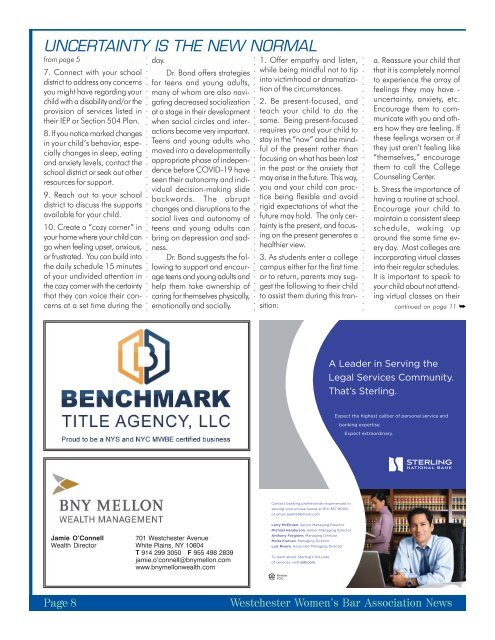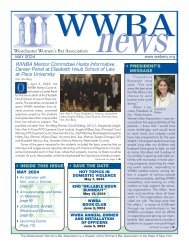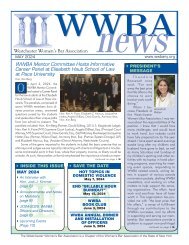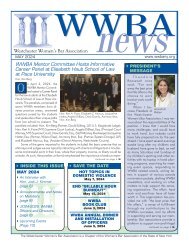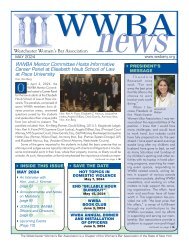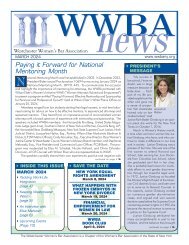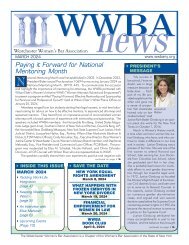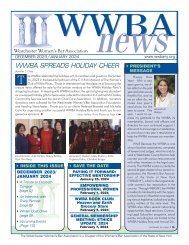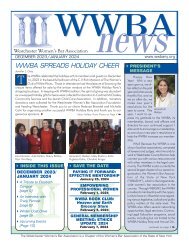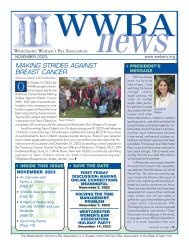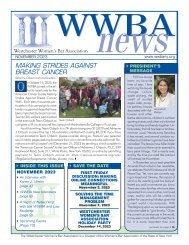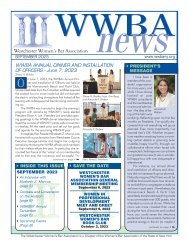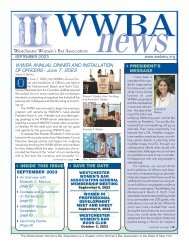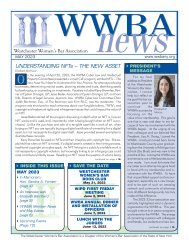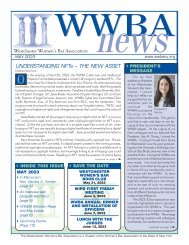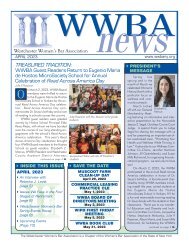WWBA September 2020 Newsletter - M
You also want an ePaper? Increase the reach of your titles
YUMPU automatically turns print PDFs into web optimized ePapers that Google loves.
○ ○ ○ ○ ○ ○ ○ ○ ○ ○ ○ ○ ○ ○ ○ ○ ○ ○ ○ ○ ○ ○ ○ ○ ○ ○ ○ ○ ○ ○ ○ ○ ○ ○ ○ ○ ○ ○ ○<br />
○ ○ ○ ○ ○ ○ ○ ○ ○ ○ ○ ○ ○ ○ ○ ○ ○ ○ ○ ○ ○ ○ ○ ○ ○ ○ ○ ○ ○ ○ ○ ○ ○ ○ ○ ○ ○ ○ ○<br />
UNCERTAINTY IS THE NEW NORMAL<br />
from page 5<br />
7. Connect with your school<br />
district to address any concerns<br />
you might have regarding your<br />
child with a disability and/or the<br />
provision of services listed in<br />
their IEP or Section 504 Plan.<br />
8. If you notice marked changes<br />
in your child’s behavior, especially<br />
changes in sleep, eating<br />
and anxiety levels, contact the<br />
school district or seek out other<br />
resources for support.<br />
9. Reach out to your school<br />
district to discuss the supports<br />
available for your child.<br />
10. Create a “cozy corner” in<br />
your home where your child can<br />
go when feeling upset, anxious,<br />
or frustrated. You can build into<br />
the daily schedule 15 minutes<br />
of your undivided attention in<br />
the cozy corner with the certainty<br />
that they can voice their concerns<br />
at a set time during the<br />
day.<br />
Dr. Bond offers strategies<br />
for teens and young adults,<br />
many of whom are also navigating<br />
decreased socialization<br />
at a stage in their development<br />
when social circles and interactions<br />
become very important.<br />
Teens and young adults who<br />
moved into a developmentally<br />
appropriate phase of independence<br />
before COVID-19 have<br />
seen their autonomy and individual<br />
decision-making slide<br />
backwards. The abrupt<br />
changes and disruptions to the<br />
social lives and autonomy of<br />
teens and young adults can<br />
bring on depression and sadness.<br />
Dr. Bond suggests the following<br />
to support and encourage<br />
teens and young adults and<br />
help them take ownership of<br />
caring for themselves physically,<br />
emotionally and socially.<br />
1. Offer empathy and listen,<br />
while being mindful not to tip<br />
into victimhood or dramatization<br />
of the circumstances.<br />
2. Be present-focused, and<br />
teach your child to do the<br />
same. Being present-focused<br />
requires you and your child to<br />
stay in the “now” and be mindful<br />
of the present rather than<br />
focusing on what has been lost<br />
in the past or the anxiety that<br />
may arise in the future. This way,<br />
you and your child can practice<br />
being flexible and avoid<br />
rigid expectations of what the<br />
future may hold. The only certainty<br />
is the present, and focusing<br />
on the present generates a<br />
healthier view.<br />
3. As students enter a college<br />
campus either for the first time<br />
or to return, parents may suggest<br />
the following to their child<br />
to assist them during this transition:<br />
○ ○ ○ ○ ○ ○ ○ ○ ○ ○ ○ ○ ○ ○ ○ ○ ○ ○ ○ ○ ○ ○ ○ ○ ○ ○ ○ ○ ○ ○ ○ ○ ○ ○ ○ ○ ○ ○ ○<br />
a. Reassure your child that<br />
that it is completely normal<br />
to experience the array of<br />
feelings they may have -<br />
uncertainty, anxiety, etc.<br />
Encourage them to communicate<br />
with you and others<br />
how they are feeling. If<br />
these feelings worsen or if<br />
they just aren’t feeling like<br />
“themselves,” encourage<br />
them to call the College<br />
Counseling Center.<br />
b. Stress the importance of<br />
having a routine at school.<br />
Encourage your child to<br />
maintain a consistent sleep<br />
schedule, waking up<br />
around the same time every<br />
day. Most colleges are<br />
incorporating virtual classes<br />
into their regular schedules.<br />
It is important to speak to<br />
your child about not attending<br />
virtual classes on their<br />
continued on page 11 ➥<br />
A Leader in Serving the<br />
Legal Services Community.<br />
That’s Sterling.<br />
Expect the highest caliber of personal service and<br />
banking expertise.<br />
Expect extraordinary.<br />
Contact banking professionals experienced in<br />
serving your unique needs at 914-367-9000,<br />
or email team556@snb.com<br />
Jamie O’Connell<br />
Wealth Director<br />
701 Westchester Avenue<br />
White Plains, NY 10604<br />
T 914 299 3050 F 955 498 2839<br />
jamie.o’connell@bnymellon.com<br />
www.bnymellonwealth.com<br />
Larry McElroen, Senior Managing Director<br />
Michael Henderson, Senior Managing Director<br />
Anthony Forgione, Managing Director<br />
Moira Kiernan, Managing Director<br />
Luis Rivera, Associate Managing Director<br />
To learn about Sterling’s full suite<br />
of services, visit snb.com.<br />
Member<br />
FDIC<br />
Page 8<br />
Westchester Women’s Bar Association News


